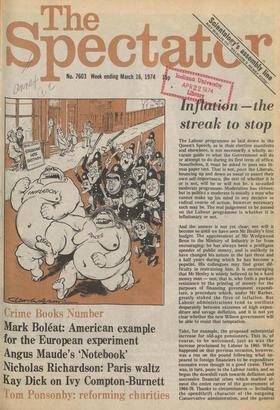nThnn the streak to stop
The Labour programme as laid down in the Queen's Speech, as in their election manifesto and elsewhere, is not necessarily a wholly accurate guide to what the Government will do or attempt to do during its first term of office. Nonetheless, it must be asked to pass one litmus paper test. That is not, pace the Liberals, bouncing up and down as usual to assert their own self-importance, the test of whether it is or is not, will be or will not be, a so-called moderate programme. Moderation has virtues; but in politics a moderate is usually a man who cannot make up his mind to any decisive or radical course of action, however necessary such may be. The real judgement to be passed on the Labour programme is whether it is inflationary or not.
And the answer is not yet clear; not will it become so until we have seen Mr Healey's first budget. The appointment of Mr Wedgwood Benn to the Ministry of Industry is far from encouraging: he has always been a profligate spender of public money, and is unlikely to have changed his nature in the last three and a half years during which he has become a populist. His colleagues may find great difficulty in restraining him. It is encouraging that Mr Healey is widely believed to be a hard money man — one, that is, who feels a puritan resistance to the printing of money for the purposes of financing government expenditure, a procedure which, under Mr Barber, greatly stoked the fires of inflation. But Labour administrations tend to oscillate desperately between extremes of high expenditure and savage deflation, and it is not yet clear whether the new Wilson government will be able to resist that temptation.
Take, for example, the proposed substantial increase for old-age pensioners. This is, of course, to be welcomed, just as was the increase proclaimed by Labour in 1965. What happened on that previous occasion, however, was a run on the pound following what appeared to foreign financiers to be expenditure excessive even though in a good cause. There was, in turn, panic in the Labour ranks, and so began the downhill rush towards deflation and successive financial crises which marked almost the entire career of the government of 1964-70. Thanks to circumstances — including the spendthrift character of the outgoing Conservative administration, and the general and correct feeling that Labour ministers are far more experienced now than in 1964 — Pension increases are unlikely this time to create such a furore. But the point to remember about last time is that, from 1965 to 1970, pensioners received scarcely any benefit at all from a Labour government in the throes of continual crisis. Indeed, over all, they did far better under Mr Heath.
The moral is clear. Not the public interest only, but the specific interests of those underprivileged sections of the community which Labour is sworn to protect, depend on sound and prudent public finance. Hitherto, though not in the early 'sixties, nor between 1971 and 1974, the Conservatives have been regarded as the party of sound finance, and the party most likely to seek the balance of the budget: Labour have been the Micawbers of national finance, and there are still ministers in the Wilson government who merit this melancholic description. Whatever the cost in lost aspiration, whatever the temptations that need to be resisted, the nation's plight demands from Mr Wilson and Mr H ealey a sober approach to the business of balancing expenditure with income. We will know by the end of the month whether they appreciate the magnitude of their task, or even its existence. If they discharge it well the nation will have cause to feel gratitude.
Spain and the bishops
Relations between Church and State in Spain remain in a state of some turmoil and confusion following General Franco's unwilling acceptance of a statement both by the Council of Bishops and by Mgr Antonio Anoveros, Bishop of Bilbao, to the effect that the latter's Open plea for greater leniency in the treatment of Basque separatists was not intended to be an effort to undermine national unity. It is clear that the Spanish Government has its doubts about this gloss on the bishop's statement but that, with the moderation that Characterises all Spanish foreign policies save that concerning Gibraltar, it has been decided to damage no further relations with the Vatican, Pope Paul being understood to have questioned the value of the 1953 Concordat With Spain. All Spanish governments, of whatever character have, for a century or more, faced two paramount difficulties. The first is to Maintain the unity of a country naturally fissiparous (even General Franco's home state of Galicia is noted for its intransigence towards central government) and the second is that of the state-within-a-state character of the Spanish Church. Under the present arrangement, for example, bishops and priests enjoy enormous privileges, and are, in many respects above the law: since the Spanish clergy has grown increasingly hostile to the Government, and joined willingly in the trend-hopping activities of the Spanish left, it must be questioned whether the Concordat Which protects their special position in Spain is any longer worth preserving. National unity must be the first charge on any Spanish government, and nothing, surely, can be allowed to stand in the way of its preservation. In the difficult period of transition which Spain has now entered, the problem of Preservation, both of the country and of order, becomes especially acute, and over-mighty Priests — particularly Bishop Anoveros, who, Whatever he says now, undoubtedly used the Word 'autonomy' in his original address most not be allowed to exacerbate it.
Standards in schools
There can be nothing less than the heartiest welcome for the strictures of the Associated Examining Board on proposals to replace the A Level examinations with an easier form of final school test. A working party of the Schools Council has already suggested that there should be a two-tier system to replace A Levels but, says the Board, "These proposals as they stand run the risk of encouraging mediocrity at the expense of excellence and the more able pupils are unlikely to favour a system that contains such a risk." At last, then, there is some indication of a willingness to take a robust view in support of the attempt to maintain, and even increase, standards in British schools and, therefore, in universities. Already our standards are declining and, even such as they are, are in further danger from the 'progressive' movement in education. The return of a Labour government, traditionally the friend of lower standards and greater and more inadequate collectivisation in education, must have greatly increased the fears of those concerned for standards, even though we have been fortunate in getting Mr Prentice rather than Mr Edward Short as a replacement for Mrs Thatcher. Nonetheless, a Labour government, almost by its nature, presents a threat to quality in education and one must wonder what, for example, is now to happen to the Bullock Report on literacy, designed by the late Secretary of State as one of her principal weapons in the fight to reveal to British parents what was happening to their children in the name of progressive education, and to encourage them to resist the current fashions. Perhaps bodies like the Associated Examining Board will be able to continue the fight.
Anthony Barber
Mr Anthony Barber, as various columnists in The Spectator have said more than once, was the supreme party politician of his time. No derogation is intended by this appellation. In 1970 the then Chairman of the Tory Party, sustained its spirit in the face of opinion-poll adversity again and again. And he was proved right in the event of victory. As Chancellor of the Exchequer Mr Barber was a curious mixture. He defied the Treasury knights, as lain Macleod failed to, with his insistence on a tax-cutting policy, but he went along with them and the then Prime Minister on a growth policy which involved the most fantastically prodigal expenditure. Nonetheless, serious social objectives were always apparent to him: as Sir Keith Joseph has on many occasions acknowledged, the large and intelligent welfare expenditure of the late Conservative government would not have been possible without Mr Barber's goodwill. Since this is a country and a polity most noted by its aspirations, Mr Barber can confidently be put down as a Chancellor who sought the highest social possibilities: the cheap accusations made against him by Mr Jenkins were merely the embittered testimonies of a Chancellor who had failed again and again to achieve even one of the higher hopes of his party. Mr Barber may have failed to achieve both financial balance and social welfare success — but he tried most generously for the latter. He was, besides, a considerable gentleman, and a man of great courtesy and kindliness. His decision to retire first to a non-Treasury brief, then to the backbenches, and to contemplate a peerage, leaves the Tory Party even further impoverished.



































